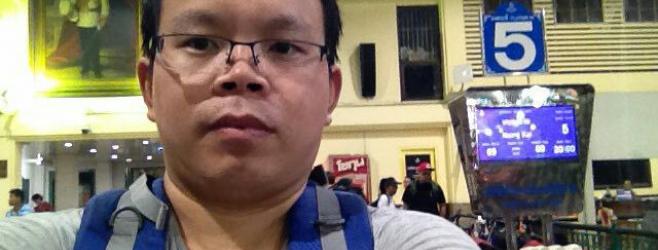

Chinese journalist Li Xin last made contact with his partner on 3 February, in which he said he had „voluntarily“ returned to assist with an investigation. His partner, however, believes that Li Xin was forced by the Chinese authorities to return to China.
On 11 January, Li Xin sent an SMS message to his partner indicating that he was travelling to the Thailand-Laos border. Following this, on 2 February, his partner received a call from Chengguan Town Police Station – Li Xin’s hometown in Henan province. She was told that she would receive a call from Li Xin the following day. On 3 February, Li Xin called and told her to „lead a stable life“ and „not to communicate with people outside,“ and that he would „try his best to return as soon as possible.“ Li Xin did not say where he was.
Li Xin first escaped from China in October 2015, firstly to India, where he revealed in a media interview that Chinese state security officials had put him under intense pressure to act as an informant against his colleagues and friends. These officials threatened to imprison Li Xin if he refused to cooperate. After initially cooperating, he refused to continue, since he believed he was placing himself and his family in danger. Li Xin decided to leave China, although his pregnant partner and two-year-old son remained in China. After being denied asylum in India, Li Xin travelled to Thailand, where he planned to apply for refugee status and seek settlement in another country.
Li Xin’s case is the latest in a series of cases where dissidents and members of ethnic minorities have been forcibly returned to China from countries in South East Asia.
Celé znění on-line petice, kterou posíláme adresátům.
Demanding that the Chinese authorities immediately disclose Li Xin’s whereabouts and legal status;
Urging the authorities to release him immediately and unconditionally, unless he is formally charged with an
internationally recognizable criminal offence;
Pending his release, urging the authorities to ensure that he is not subjected to torture or other ill-treatment in
detention, and that he has regular, unrestricted access to his families and lawyers.
Dear Premier,
I am deeply concerned by the case of Li Xin, who is suspected of being held in police custody without being charged.
We ask you to clarify the situation and whereabouts of Li Xin. If you will not charge him with an internationally recognizable criminal offence, he should be released immediately. If he is detained by the government, we would like to ensure that is treated in accordance with UN conventions.
Sincerely,